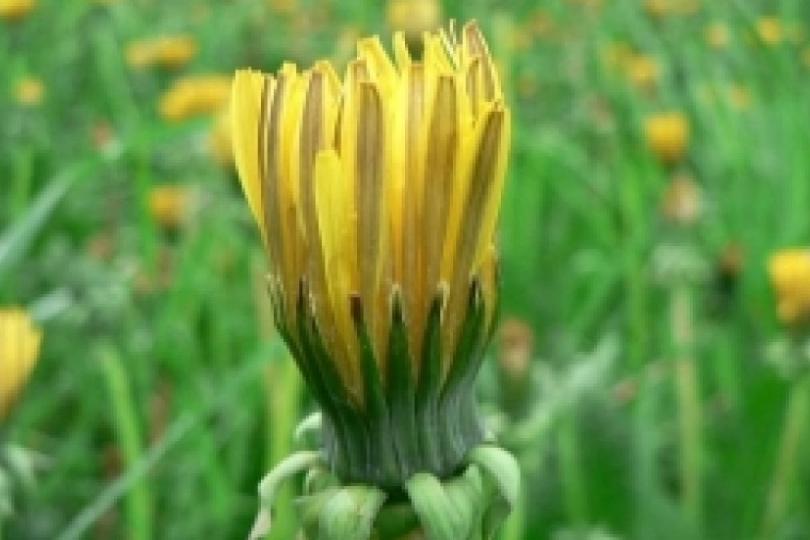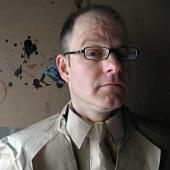Exploring change for the awkward arts zealot: Local
Editorial

Editor's note: We recently put out a call for theater artists to talk to us about the kinds of change they want to see in the local arts scene. We're pleased to present the second installment of Skewed Visions co-founder Charles Campbell's four-part series on change, this time from a local perspective. (Read Charles' take on personal change here, and stay tuned for his ideas on change from a global and survival perspective.)
2. Local
Change in the context local theatrical community* as seen from under the table
Skewed Visions within the local ecosystem
Now the possibilities for complexity and confusion breed. Because I will not be exhaustive or objective – or quite possibly, even coherent – I’ll start with what I hope is a tool for revealing my subjectivity while inquiring into the differences around me.
It’s a question flexibly local, acrobatically specific, spherically open, and endlessly recyclable; and propelled by a churning, proliferating, multidirectional desire: What’s up?
What is the ecosystem?
There is always something to be gained by knowledge of one’s surroundings. To know who is doing what work and why, who is getting funded for doing what work and why, who is funding what work and why, who is popular, who is the new kid, who is the Inconsolable, who is the MacGyver, and all those Breakfast Club identikits.
After all, for Skewed Visions, that kind of search is where site-based practices are rooted. Take advantage of the environments in which you operate, rather than work against them. Performance Aikido. This isn’t a method, though. It’s a practice. It is a question, a process, an active engagement with the world, a verb, something to do.
But I am not terribly interested in the answer to Who Does What. That question tends to generate simple categories and masks idiosyncrasies. Don’t get me wrong: it is vital to have information, the politics and economics. Knowing the structures within (or against) which you must work is, naturally, as necessary as breathing. (And for some the politics and economics are as clear and present as a daily beating.)
Instead I am interested in looking at this ecosystem as Skewed Visions, which, as you may recall, involves movement and practice, rather than stability and identity. Because I want room for movement.
*Ecosystem vs Community
Language has a tangled relationship to reality and how we use one affects the other. So while “community” is usually about a group of people sharing some characteristic, like geography, culture, or an interest in MMOGs; “ecosystem” is about a bunch of interconnected relationships that includes individuals and systems of various scales.
For this writing, I prefer the second. It is more flexible and more open. It allows more factors to be considered – especially those that may be considered extraneous or peripheral by a particular community, like race, class, gender, economics, privilege, theory, childcare, insurance, friendship, law, activism, history, change, and/or the intricate machinery of desire.
It allows us to think about the environment in which we find ourselves as a complex of relations that can be parsed in multiple ways (with the corollary that each parsing is nonobjective). As a consequence it allows relationships to be seen that determine the possibilities in which you exist.
Just don’t forget that divisions into oppositions like Ecosystem vs Community are useful for disrupting monolithic ideas, but can get ugly when you linger too long on the act of division. Once you start parsing such things it’s too easy to end up spending your one wild and precious life counting beans and putting people into cages.
A different kind of grassroots – The Dandelion
I’m not entirely satisfied with the ecosystem model, in part because it makes it all sound like either a pastoral Disney® landscape of furry woodland creatures helping sweep up after each other (and paying each other’s bills, I guess), or else some kind of vicious, red-in-tooth-and-claw, shrieking maelstrom of death. Actually, “ecosystem” might not be a bad term since together these associations are not entirely off-base.
So what’s up in this ecosystem? Well, while we are all here, flailing, we are given a zillion terms meant to clarify things. One is the concept of the Grass Roots – usually used within kissing distance of money and politics. But it can also be seen as a term for a collection of smaller things that from a certain distance look homogenous and are connected to each other in ways that are not readily visible. In this case, we are all part of the grassroots. Which to me raises certain questions, such as: When we are asked for money, are we just “mowing the lawn”? And does it always grow back? Who is the Homeowner? Why does a fancy golf course get equated with my scruffy backyard, but the golfers never pay me any greens fees?
Now bear with me for a(nother) sec. Being the cultural connoisseur you are, you’ve read about what’s happening with the Corcoran Gallery and you recognize it as only one recent episode in the long-running series of Longstanding Respected Arts Organization Felled by Seeming Ineptitude On The Part of Some Fool(s). The Minnesota Orchestra. The Southern Theater. The Bush Foundation Artist Fellowship. (Did I say that one out loud?) Theatre de la Jeune Lune. Et cetera.
I feel that this series often gets undue attention and that really, there’s a grittier indie version I like better, called Artists Hanging By Teeth Pass It Off As Smile.
Because in the end, they aren’t dead – any of them – really. The artists who were at the center of these organizations are still alive, mostly. They’re still doing work, mostly. And as much as I wish that their supporting organizations were still around providing them with cachet and opportunities, my real admiration is for the individual artists. Robert Mapplethorpe. Osmo Vänskä. Jeff Bartlett. Dominique Serrand. Barbra Berlovitz. And so on.
All these artists that I respect, whose organizations have done them wrong, as well as all the artists that are without a supporting organization, or even those who have a supporting organization that works – in fact, may I quietly venture, ALL TEH ARTISTZ – are the dandelions in the lawn. You can put them in a pretty vase for your bathroom, you can poison us all in trying to tame them, you can pluck them up by their nether parts, you can go ahead and deflower them in any way you choose, but by god they are dandelions and they are inalienable. Even all your love can’t kill them. Maybe the orgs are just lawn care?
Don’t pour that Roundup® on me, Mr. Monsanto.
Posit: “Grassroots” involves a presumption of equality that comes from the imposition of generalities, rather than from a wider body of knowledge that arises after painstaking investigation of particular individuals in specific circumstances. If we are talking about the local ecosystem and artists within it, then I’m thinking about dandelions as being the aberrant among the grassroots.
Artists are people, generally speaking, and have a multitude of possible roles, functions, and characteristics. But I want the world to appreciate the art, support the art, and not need to search for rationalizations for it, regardless of how tangibly beneficial art can be. Because these rationalizations impact what it is possible to think, do and make, as an artist. To achieve this freedom is a massive struggle, an impossible challenge, and a doomed effort. But hell, we’re artists: what else is new?
Dandelions take part in a different system. It’s not like a lawn, with those grass roots shooting off in all directions underground, all on the same level. Tended by a Homeowner that provides the sustenance and then mows whatever sticks its head up. Dandelions connect by complementing what already exists. They make seeds that float off on the wind, a complex vector of dispersal that is outside of themselves and beyond their control. This is a productive relationship. It respects the integrity of the dandelion and the independence of the wind. Will it really help a dandelion sustain itself by getting together with a bunch of other dandelions? Maybe, but only from a perspective that is provided by something that may be organic but is emphatically not a dandelion.
What I want is not a nice green lawn, or even a field of dandelions.What I want is the smell you get when the sun sort of bakes that yellow and green odor that comes your way and suddenly it’s like you’re 8 years old in the neighbor’s field again with the birds and the heat and the dirt and you’re rubbing dandelions under your sister’s nose. It’s the smell of dandelions, intangible and fragile and vulnerable to every breeze.
You can’t get it without dandelions, and that’s why we need dandelions. Not because dandelions improve educational scores or enliven public spaces. Which, in this very odd metaphor, they also do. But the smell of dandelions. This is what underlies my sense of the artistic ecosystem and the possibilities for our places within it.
Model Behavior vs Transmission
So we began a couple years ago with what we like to do: watch movies and talk about them. Invite a few friends over, break out the wine and chocolate, and you’ve got a party. Admittedly it’s a specific kind of party. A sit-around-watch-movies-and-talk-about-them kind of party. One in which the smell of dandelions becomes part of the conversation. How is this made? Why was it made? What does it do? What inspiration does it offer? How does it model what not to do? We get arguments, discussions, chatting, and silence. But it is the creation of a space that makes room for the smell of dandelions.
We at Skewed Visions call it Screen, and we’ve got one for music/sound called Notes, one for live performance called How Dare You! , and one for books, articles, and writings called Book Talk. Since together they form kind of a medium in which to cultivate thoughtful work, we’re calling it Petri Dish. Promotion aside, the idea is not to teach people what we think good art is so that they will replicate more in some sort of Blade Runner scenario, but instead to foster behavior that seems to lead to thoughtful work: thinking. It’s got a bad reputation, thinking does, but it’s not limited to esoteric academia and it’s more physical than many give it credit for. (Dancers tend to know this.) It can also be highly enjoyable.
Being the change you want to see in the world means never winning at the crapshoot
Not to kill the floral buzz here, but being a dandelion means some people think you’re just pretty and some people think you’re just a weed. That’s part of the package. You can cultivate the odor, but it doesn’t mean you’ll smell any better.
There are some of who say, Look, just join the lawn. You’re not a weed. Together we’ll make a rich, diverse, grass carpet.
But, you say, I’m a dandelion!
There are others who say, Dandelions unite for a Field of Dandelions!
But, you say, I like my friends!
And then there are those who bring out their tools every week to uproot you or poison you or cut off your head, to whom your words are inadequate.
There are new models offered. New ways of working. New collaborations and new funding structures. New manifestoes and new research. But there is no answer. There is no winning at this. There’s no way out. There is no achievement stage except the one that you’re on. You don’t emerge, mature, hit mid-career, and then succeed. At the end of that line is nothing but death: actually dying. “Growth” is a lens ground by an oncologist. This, what you’re doing, is the right thing. This place, your current location, is where you are. Success is a product of hindsight. Just do the right thing.
Eventually, you may come to the conclusion that you’re doing the right thing not because it’s easy, or even because it will save us, but only because it smells good. At least, that’s my experience.




